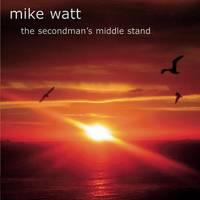Mike Watt has always made references to his own life and those he holds dear in his vast catalog of songs since the days of the Minutemen. "History Lesson Part II" from the Minutemen's classic Double Nickels On The Dime album comes immediately to mind; fIREHOSE tracks like "Me And You, Rememberin'" and "Disciples Of The 3-Way", and "Piss-Bottle Man" from his first solo album, 1995's Ball-Hog And Tugboat would also be good examples of this. He's also made reference to many favorite works of literature in his songs ("June 16th" from Double Nickels refers to 'Bloomsday', the day James Joyce's Ulysses takes place.)
With his second solo album, 1997's brilliant Contemplating The Engine Room, he took his non-egotistical self-referencing and his literary influences a step further by writing a punk rock opera in which he parallels the stories of his father's Navy days with the history of the Minutemen and a Sand Pebbles-inspired storyline about "three guys in a boat" traveling the world. After touring behind Engine Room for a year, Watt almost never got a chance to follow the album up. A misdiagnosed infection in his purenium (the area behind a man's testicles) became an abcess and almost killed him in January of 2000, requiring emergency surgery. After being laid up for almost ten weeks, unable to play, Watt endeavored to rebuild his chops, using classic Stooges songs as a launching pad. This particular story is now the basis for Watt's long-awaited third solo album, The Secondmen's Middle Stand.
Like Engine Room before it, The Secondmen's Middle Stand is a punk rock opera, and is partially inspired and paralled with a favorite Watt piece of classic literature, Dante's Divine Comedy. Unlike its predecessor, however, TSMS is wholly autobiographical. The album's nine songs are divided into three sections of three songs each, similar to the Dante book -- "Hell", "Purgatory", and "Heaven". No, Watt hasn't gone religious. Instead, "Hell" for Watt was the month-long illness up to and including the bursting of the abcess that almost killed him, "Purgatory" was the surgery, hospital stay, and subsequent rehabilitation and recovery, and "Heaven" was getting to step out of the house, play bass, ride his bike, and paddle his kayak again.
Musically, TSMS is performed by a three piece unit with Watt on bass and two San Pedro musicians (for the first time since the demise of the Minutemen) - drummer Jerry Trebotic and organist/backing vocalist Pete Mazich, who make up one of Watt's many post-fIREHOSE trios, The Secondmen. On the album, they are supplemented with backing vocals from ex-That Dog member Petra Haden. The nine songs on TSMS are Watt's most complex to date, but they're still punk in spirit.
"Boilin' Blazes" kickstarts the album (and the opening "Hell" section) with a few seconds of Watt bass before the entire band kicks in, as Watt - his singing voice delibrately showing the stress and anxiety he endured during the actual illness - tells his first-person tale over soaring, almost Rick Wakeman-esque organ chord clusters from Mazich. "Puked To High Heaven" follows; this time, Watt, Mazich and Haden bring a church-like feel to the proceedings. "Burstedman" follows with a twisted maze of odd-time signatures and distorted bass. For the only instance on the album, Watt departs from the autobiographical viewpoint of the story and instead portrays the illness that tormented him. The song's instrumental middle section features Sun Ra-like discordant keyboard work from Mazich while Watt uses a Whammy pedal to make his bass sound like a Theremin.
"Tied A Reed 'Round My Waist" starts the "Purgatory" section of the album with the most gentle sounds on the album so far, representing Watt's demeanor as he goes through the surgery that saves his life. "Pissbags and Tubing" follows with another odd time signature (5/4 time) over which Watt tells the take of his post-op recovery. "Beltsandedman" closes out the "Purgatory" section, with both Watt's voice as well as his bass being put through fuzzboxes to match the song's mood and title.
The closing "Heaven" section starts off with the song's most uptempo piece, "The Angels Gate" (named after the harbor in San Pedro). While Mazich conjures up his inner Rick Wakeman again by way of The Stranglers to propel the tune with frantic organ arpeggios, Watt - almost shouting for joy at this point - recalls how he struggled to try to "find a groove" again after nine-plus weeks of not being able to play his bass until it occurs to him to "play like a Stooge" - i.e. he used Stooges songs to help rebuild his chops: "Gotta send respect to Dave [Alexander, Stooges bassist]/His bass lines saved the day/Reaching out from beyond the grave." [Watt, of course, has since gone from playing like a Stooge to actually becoming one of the Stooges!] "Pluckin' Pedalin' and Paddlin'" follows with an appropriate, almost bicycle-riding-tempo groove. "Pelicanman" closes out the proceedings with loping, circular bass lines, as Watt looks forward to the rest of his life now that one of the most trying ordeals of that same life is over with.
The various trials and tribulations that occured in Watt's life and career in the five years between the end of the Engine Room tour in 1998 and 2004 - including touring as part of J. Mascis & The Fog in 2000-2001 and becoming a full-fledged member of the Stooges - made for the longest time he has ever taken between recording and releasing records, but the end result of the compelling music and lyrics of The Secondman's Middle Stand make it worth the long wait.
